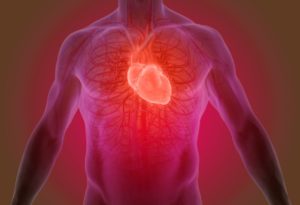Am I Having Heartburn or a Heart Attack?

You’re experiencing chest pain after a big meal. It could be your heartburn acting up. However, it’s also possible that the chest pain is a sign of an impending heart attack. These two issues often feel very similar, making it hard to determine the difference. As a result, emergency room doctors will typically perform diagnostic tests to rule out a heart attack if you’re experiencing chest pain.
What Is Heartburn?
Heartburn is caused by acid reflux, a condition that occurs when the acid in your stomach rises up into your esophagus (the tube connecting your mouth to your stomach). While the lining of your stomach is strong enough to handle these acids without any pain, your esophagus doesn’t have the same kind of protective lining. As a result, a burning sensation often occurs when this acid enters your esophagus, and it can cause chest pain.
Common symptoms of heartburn include:
- Burning sensation in the upper abdomen and chest
- Pain that extends upward towards your throat
- Bitter or acidic taste in the back of the throat
- A small amount of stomach contents may rise back into your mouth
In addition, these symptoms typically develop after a meal and become worse when you bend over or lie down. If you’ve eaten a meal shortly before bedtime, you may wake up in the middle of the night with painful heartburn symptoms. Often, the pain can be relieved by taking antacids.
What Is a Heart Attack?

- Pain that spreads into the arms, jaw, neck, or shoulders
- Shortness of breath
- Lightheadedness or dizziness
- Fatigue
- Cold sweat
- Nausea
Not all of these symptoms will be present with every heart attack, and they can often vary in severity. While chest pain is the most common symptom and typically occurs with all heart attacks, women tend to develop these secondary symptoms heart attack symptoms more frequently than men.
How Can I Tell the Difference between Heartburn and a Heart Attack?
It can often be difficult to tell the difference between these two issues based on symptoms alone. However, there are some indicators that may help you determine whether you’re experiencing a heart attack or heartburn:
- Heartburn tends to occur after a meal and be more painful when lying down
- Antacid drugs can relieve heartburn symptoms, but won’t alleviate chest pain associated with a heart attack
- More generalized symptoms such as breathlessness or pain extending into the neck, shoulder, and jaw typically don’t occur with heartburn
- Pain extending into your throat is typically associated with heartburn
- Belching and bloating often occur from heartburn but are not associated with a heart attack
- Strenuous activity will often make heart attack symptoms worse
When Should I See a Doctor?
Due to the serious nature of a heart attack, it’s always best to play it safe and seek medical attention if you’re experiencing persistent or unexplained chest pain. Always call 911 and request emergency medical assistance if you’re experiencing chest pain that lasts more than a few minutes or that returns intermittently. Prompt treatment can potentially save your life.
South Denver Cardiology Associates Can Help
South Denver Cardiology Associates provides award-winning cardiac care focused on helping you achieve a healthier life. We offer comprehensive diagnostic testing to determine whether your symptoms are heart-related or not. Once we’ve accurately diagnosed the cause of your symptoms, we’ll work with you to develop the right treatment plan to manage your condition.
Please contact us today to schedule a consultation. South Denver Cardiology Associates serves patients in Denver, Littleton, and the surrounding areas of Colorado.
- 6 Tips for Exercising Outdoors with a Heart Condition - May 19, 2025
- Lifestyle Changes That Can Help Manage Arrhythmia - April 30, 2025
- Common Treatments for Peripheral Vascular Disease - April 23, 2025
Sign Up
As with any health concerns, your specific treatment program should be discussed thoroughly with your primary care physician as well as any specialists who may need to be consulted – like a cardiologist.
Sign Up
